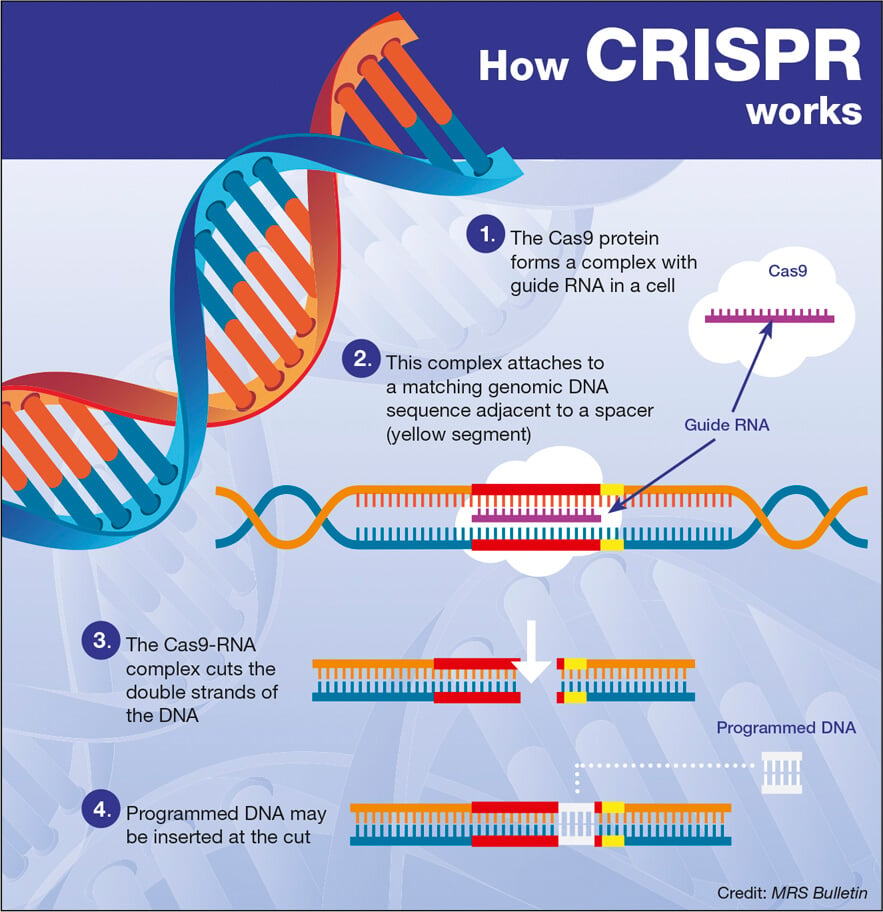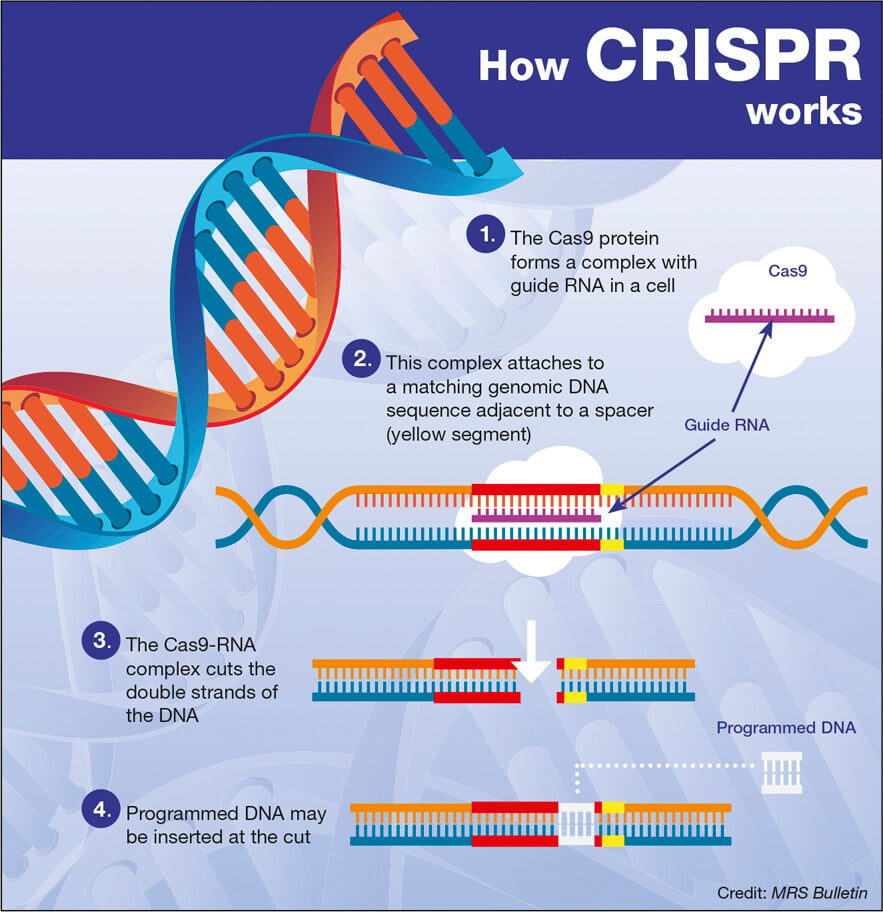CRISPR gene editing has emerged as a groundbreaking technology in the realm of genetic research, promising revolutionary advancements in medicine and agriculture. This powerful tool allows scientists to make precise modifications to DNA, offering potential cures for genetic conditions like sickle cell disease. However, alongside these hopeful possibilities lie complex gene editing ethics that raise critical questions about the implications of altering human genetics. As researchers explore the boundaries of CRISPR technology, concerns regarding genetic modification abound, including issues of health equity in gene editing. Understanding these facets is vital as society navigates the benefits and risks associated with this innovative yet controversial field.
CRISPR gene editing, often referred to as a cutting-edge method of genetic manipulation, represents a significant leap forward in our ability to alter DNA with precision. Also known as clustered regularly interspaced short palindromic repeats, this technique opens up a world of possibilities, particularly in addressing genetic disorders and improving agricultural yields. However, the conversation surrounding genetic engineering is not just about the science; it also encompasses a range of ethical considerations that challenge our values and beliefs. These discussions often highlight the intricate balance between the promise of genetic solutions, such as cures for conditions like sickle cell anemia, and the moral dilemmas of modifying human life. As we advance into this new era of biotechnology, it is crucial to carefully evaluate the societal implications and potential disparities that may arise.
The Ethical Landscape of Gene Editing
The rise of CRISPR gene editing technology has brought forth a host of ethical dilemmas that society must navigate carefully. One of the most pressing questions is not just whether we *can* edit human genes, but *should* we do so? As scientists explore the potential of gene editing to cure debilitating conditions like sickle cell anemia and beyond, the moral implications rise to the forefront of public discourse. Discussions around gene editing ethics challenge us to consider the long-term effects these technologies may have not only on individual patients but also on broader societal norms and values.
At the heart of this ethical debate lies the question of consent and the rights of future generations. When we apply CRISPR technology to germline cells, we may alter genes that will be passed down to descendants, raising concerns about the type of genetic legacy we leave behind. What happens when decisions made today pave the way for enhanced physical traits, intelligence, or even aesthetic preferences in future generations? This move towards ‘designer babies’ could exacerbate existing social inequalities, leading to a gene-editing divide based on economic status. Therefore, it is crucial to engage in thoughtful discussions about the regulations and guidelines that should govern gene editing practices.
Frequently Asked Questions
What are the ethical implications of CRISPR gene editing?
CRISPR gene editing raises several ethical concerns, including issues of ‘playing God’, the alteration of human traits, and how such technology may exacerbate health inequities. As gene editing progresses, we must navigate who decides which traits are desirable and how to ensure access to these life-altering treatments across different demographics.
How does CRISPR technology enable the cure for sickle cell disease?
CRISPR technology allows for targeted editing of genes associated with sickle cell disease, effectively removing the mutations responsible for the condition. By manipulating somatic cells, treatments can provide a functional cure, while germline editing could potentially eliminate the disease from future generations.
What are the concerns regarding genetic modifications in CRISPR applications?
Concerns surrounding genetic modifications through CRISPR include potential unintended consequences, the impact on genetic diversity, and the ethical dimensions of editing genes for non-life-threatening conditions. Moreover, the question of who gets access to CRISPR technology raises significant equity issues.
How does health equity relate to CRISPR gene editing advancements?
Health equity in CRISPR gene editing is vital as advancements may only benefit affluent populations, leaving marginalized groups behind. The costs associated with CRISPR treatments, like the $2.2 million sickle cell cure, highlight the disparities that might arise if access isn’t broadened, leading to increased health inequality.
What role do parents have in deciding gene editing outcomes for their children using CRISPR?
The role of parents in gene editing decisions poses significant ethical dilemmas, particularly regarding modifications that affect non-fatal traits. This raises questions about parental rights versus the autonomy of future individuals, such as whether it is ethical for parents to choose attributes that could define their child’s experience.
What are the potential risks of oversight in CRISPR technology applications?
The potential risks of oversight in CRISPR gene editing are considerable, especially in countries with lax regulations. Without stringent monitoring, unethical applications of CRISPR could emerge, such as genetic enhancements in ways that may violate ethical norms, leading to a ‘race for genetic superiority’ or misuse in areas like military applications.
| Key Points | Details |
|---|---|
| Ethical Dilemmas | Whether it is morally right to modify human genes. |
| Applications of CRISPR | CRISPR can potentially cure diseases like sickle cell anemia. |
| Costs and Accessibility | The high cost of treatments raises questions about who can afford it. |
| Health Equity Issues | Gene editing may exacerbate health disparities. |
| Decisions on Gene Editing | Ethics of parental decisions regarding genetic modifications for traits. |
| Oversight and Regulation | Concerns about lack of supervision in countries where gene editing is less regulated. |
| Unintended Consequences | Gene editing might have unpredictable effects on other biological functions. |
Summary
CRISPR gene editing represents a groundbreaking advancement in medical science, with the potential to cure previously untreatable genetic disorders. However, its application is coupled with serious ethical considerations that society must address. Decisions on its use, especially in enhancing human traits and dealing with issues of accessibility and inequality, challenge our moral frameworks. As CRISPR continues to evolve, it is crucial to navigate these complex ethical waters to ensure that the technology is used responsibly and equitably.



